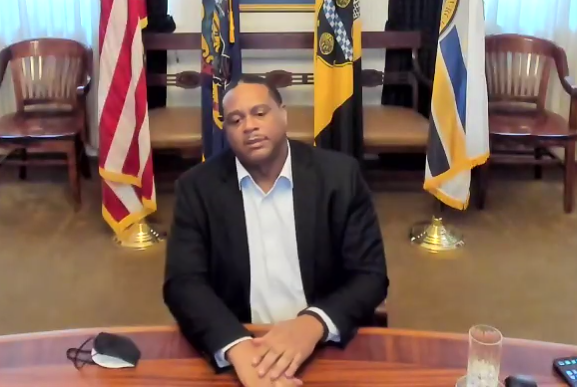
IPS Policy Forum - Town Hall with Pittsburgh Mayor Ed Gainey
On Friday, April 22, Metro21 attended a Town Hall with Pittsburgh Mayor Ed Gainey, hosted by Carnegie Mellon’s Institute for Politics and Strategy. In his opening remarks, Mayor Gainey spoke about the challenges he has faced during his administration’s first 100 days, including addressing a historically snowy winter with limited resources, a surge in gun violence impacting the city’s youth, and a further breakdown in community – police relations after an unarmed black man died in police custody. However, Mayor Gainey said that he is confident his administration will be able to respond to these challenges to build a city for all, citing the extreme diligence he has taken in filling key roles in the Mayor’s Office with proven community leaders with experience and expertise in the areas his administration wants to prioritize.
- Pittsburgh law restricts households to 3 unrelated individuals. Will the rental inspections that are set to being as part of the recent rental registration result in households that violate the 3-person rule being fined or evicted?
- No, the rental registry inspections will focus on sanitation, maintenance, and code compliance aspects of the house.
- Does your office have plans to make city streets more multimodal?
- Our administration highly prioritizes making it easier for people in the city to get around in multiple ways.
- How should Pittsburgh proactively address violence in our communities and keep people safe?
- To be quite frank, I am still struggling with that. In the short term, we have to be able to close cases. But the underlying issue is culture, and these kids have inherited a culture of violence. It’s going to take the whole city to invest in change. Some of it will be mentoring, some will be investing in youth activities and youth ambassador problems. There are a lot of ways people communicate today that can escalate violence. The culture of violence is so rooted in American history and culture that it is now being reflected in our children and the escalating violence. Every citizen should embrace mentorship of youths. There is a difference between a role model and a mentor because mentors actually show their struggles and the lessons learned from them.
- How do you think Pittsburgh’s prison system needs to be reformed?
- Juvenile justice needs to be reimagined beyond just closing centers that are inadequate and sending kids farther away from home. Leaders need to engage communities that are investing in the youth to create a correctional system rather than a detention system. Rather than investing in the war on drugs, we need to spend money on education, community development.
- How is the city working to keep people housed and helping the unhoused?
- We need to invest in more wraparound supports for everyone, and especially for veterans coming home from war who have traumas from overseas. There is no one size fits all solution, and we need to take one bite at a time to address specific needs.
- What are your plans to keep black, educated women and men in the city and promote their advancement in the local economy?
- We were intentional about making the mayor’s administration the most diverse in the history of the city. Because you cannot ask outside partners to do something that you are not willing to do yourself, we were intent on modeling diversity because we want the city to be diverse. As America becomes more and more diverse, if your executive team is not diverse you will not be able to compete in the America of tomorrow. You need to have insights from every lens of society to build your strategy. Diversity is not an issue; it is an interest.
- How can we strengthen the relationship between universities and Pittsburgh Public Schools?
- How can CMU build those relationships? Be intentional. Are you advocating for this issue to CMU administrators to help build a better pipeline? How can the government engage CMU and PPS to envision the economy of tomorrow and use that to prepare PPS students to engage in it?
- What efforts will be made to reform Zoning and Land Use to make housing available in areas with great amenities like Shadyside and Squirrel Hill?
- We are working with Councilwoman Deb Gross to grow inclusionary zoning and being intentional that every project that gets approved must have affordable housing included.
- How can the city make it easier for businesses to operate in the city (e.g., permitting, etc.)?
- We are working to reduce frictions in the system, especially in Permitting, Licenses, and Inspections. We regularly work to improve coordination across systems and are upgrading our technology to be able to improve the process.
- What is your vision for supporting entrepreneurs in the city?
- I am working with VCs and entrepreneurs in the life sciences, especially to understand what they need from the city. Too many politicians run into that space with ideas to help, but we need to first know what services are needed from the people already working in that space and then create a plan around that. I don’t know what your business needs, but when you tell me then it is my job to listen and make that happen.
- Would you support rent control?
- We are looking at that, but I am not ready to speak officially on that. We were first focused on inclusionary zoning.
